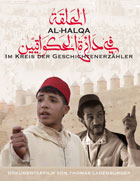
Al-Qalqa – In the Storyteller’s Circle 2010
Distributed by Cinema Guild, 115 West 30th Street, Suite 800, New York, NY 10001; 212-685-6242
Produced by Thomas Ladenburger Film Production
Directed by Thomas Ladenburger
DVD, color, 52 min.
Jr. High - General Adult
Oral Communication, Storytelling, Arabic Culture, North Africa, Morocco
Date Entered: 11/28/2011
Reviewed by Malcolm L. Rigsby, Department of Sociology and Human Services, Henderson State University, Arkadelphia, Arkansas“It’s been told – and Allah knows best, once upon a time there was…”, begins the storyteller as he invites, entices, and even pulls the crowd in a circle about him. This artfully filmed video invites each of us to examine in a realistic and almost first-hand way the rich oral traditions of Arabic and Moroccan culture. If you enjoy language, theatre, history, social and multicultural studies and how heritage is transmitted by oral traditional studies, you will enjoy Al-Halqa – In the Storyteller’s Circle.
The setting is Morocco, where we are brought into proximity with modernity and history. Here in the storyteller’s square, Djemaa el-Fna, a market place for daily activity and dialogue, we are introduced to a father and son. As we walk the streets and souk with the pair, we smell and visualize the vibrant life of the Marrakech square. Al-Halqa is a story of daily life, played out in tradition. While this life is blended with modern ways it is tempered by the love and respect between this father and son team. The father, Abderahim El Maqori, has been a storyteller since his youth, when his own father instructed him in the art of crowd gathering and transmission of life stories through the art of storytelling. The son, Zoheir, dutifully seeks to learn his father’s art so that he may occupy this central and important role in Arabic culture. Yet, as time passes, we come to see that there is an inner struggle for Zoheir. The times are a-changing as noted by Bob Dylan. Modernity and technology have created an environmental struggle between the art of storytelling and newer forms of communication. Society is changing; people seek other means of communication embedded in various media forms including radio, film, and internet. Within Zoheir we see that he senses the need to change with the times, yet he wrestles with the duty to honor his family and father.
Being a storyteller is an inter-generationally transmitted trade, one that many may call an art. It takes years of apprenticeship to develop the art of storytelling and learning how to invite people into the teller’s circle. Does modernity only increase the need for storytellers? We learn of the historic significance attached by the society to the story telling craft. Stories express the culture and its people, their needs, desires, loves, fears, and means of finding identity in life. This craft is truly integral to each society, yet due to its nature, also intangible. This social art form can slip away, as it has slipped away in many regions of our world. It seems to be slipping through the fingers of Abderahim and Zoheir’s society as well.
Abderahim works diligently with his son to assure the continuation of the art and thereby assure his family with a means of subsistence through his son’s future occupation. We see Zoheir struggle to hone his skill and become a master storyteller. Meanwhile, he must face those, who like his friend, tell him he is developing a trade that will lead him nowhere in the modern world. As so many of us have experienced in our own youth we must balance our needs along with the dreams of our parents, what society expects of us, and our own potential. This film will help us relive and evaluate our own lives. In returning to my earlier question; does modernity with all its communication technology and social capabilities only increase the need to preserve the art and profession of storytelling? I leave this to your thoughtful consideration.
Director Thomas Ladenburger, the production, and the post-production crews are to be commended on the quality of this video. Al-Halqa has excellent sound, photography and editing.